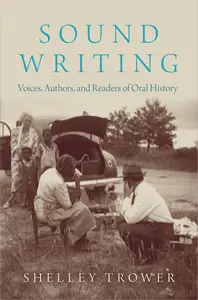- Témaindító
- #1
- Csatlakozás
- 2024.09.10.
- Üzenetek
- 43,663
- Reakció pontszám
- 8
- Díjak
- 5
- Kor
- 37

Free Download Sound Writing: Voices, Authors, and Readers of Oral History (Oxford Oral History Series) by Shelley Trower
English | 15 Aug. 2023 | ISBN: 0190905999 | True EPUB/PDF | 216 pages | 1/8.4 MB
The concept that oral history can give voice to people or allow "hidden voices" to become part of history is one of its most celebrated achievements. However, the standard practice of transcribing or summarizing interviews has meant that oral historians have had to grapple with questions of how to translate the oral into written form. What is lost or gained during this process of mediation? These re-creations can be wonderful and illuminating works of scholarship and art, and this book explores a wide range of the different forms they have taken-from John and Alan Lomax's transcriptions of African American songs for the Federal Writers Project to Svetlana Alexievich's polyphonic novels. Such works can give their subjects the necessary latitude to convey their narratives on their own terms, but there is also, always, the danger that their voices will be distorted or lost during the process of mediation.
Sound Writing offers a thorough review of the varying arguments about editing for transcription and publication and reflects on how digital technologies enable much wider access to "raw" oral data. It examines how oral histories are co-created by speakers, the authors who mediate them, and readers, and it brings into sharp focus questions about how memory takes on subjective, narrative form. Finally, it examines the interplay between written literature and sound recordings, or orality, using a diverse range of examples-from the work of William Wordsworth and George Ewart Evans to Studs Terkel, Alex Haley, Luisa Passerini, Amrit Wilson, and Stacy Zembrzycki. As an interdisciplinary study, Sound Writing takes a broad approach to the written word to encompass not only transcriptions and other texts derived from oral history interviews but also literary precursors such as epic poetry and folklore, along with various related textual forms such as biography, autobiography, and blogs. It argues that the recording of oral traditions in print by poets, folklorists, anthropologists, and postcolonial writers is comparable to practices of recording, transcribing, and publishing familiar to oral historians. Literary genres have long influenced oral history narratives, and, in turn, oral history has helped shape literary forms.
Buy Premium From My Links To Get Resumable Support,Max Speed & Support Me
Code:
⚠
A kód megtekintéséhez jelentkezz be.
Please log in to view the code.
